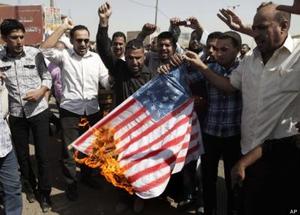Muslim unrestMany issues fueling Muslim world's anti-American backlash: expert
Anti-U.S. uprisings in the Muslim world reveal old and new tensions despite hope for better relations with the West since the Arab Spring; the sources of the unrest are suspicion of U.S. motives; ignorance of the norms and practices of democratic societies; and the more recent, and more dangerous, manipulation of these sentiments by radical, conservative Islamic groups in the Middle East and North Africa

Anti-American backlash spreading in the muslim world // Source: alfajrpress.net
Abdeslam Maghraoui, director of undergraduate studies at the Department of Political Science, Duke University, specializes in political identity, political culture, and Islam and politics, with a focus on North Africa and the Middle East. He offers helpful insights into the causes of the waves of unrest and agitation in the Muslim world in response to the publication of dissemination of material in the media which Muslims see as disrespectful to the their religion.
Maghraoui says that the current anti-American backlash in the region “is the byproduct of genuine misunderstanding, real ignorance, and political jockeying among Islamic groups”:
- In the Muslim word, there is a widespread belief that the sanctity of “freedom of expression,” often evoked in the West in these circumstances, is a cover for allowing anti-Muslim bigotry. The familiar complaint is that racist, sexist or anti-Semitic remarks are formally or informally prohibited, yet not Islamophobia. Cases where the U.S. government, the media, a court or a community has actually acted to protect Muslims’ rights are rarely reported.
- A second factor is the inability of many people in the region to distinguish between an individual action and the U.S. government. Because religious insult is heavily censured and sanctioned by Muslim states, it is assumed that the U.S. government can do the same. Therefore, an isolated act is summarily associated with a nation and its government.
- The third and more serious source of the violent backlash is the growing influence of radical, conservative Islamic groups in the region. While still a tiny minority, these groups use crises involving morality to challenge the less conservative, governing Islamic parties.
“These crises are unlikely to disappear in the near future, and the question for the U.S. is how to continue engaging moderate Islamic parties without compromising on key political values,” Maghraoui says. “The challenge for the governing Islamic parties is how to tell their constituencies that a video disparaging the prophet is far less important than their country’s social, economic and security priorities.”
